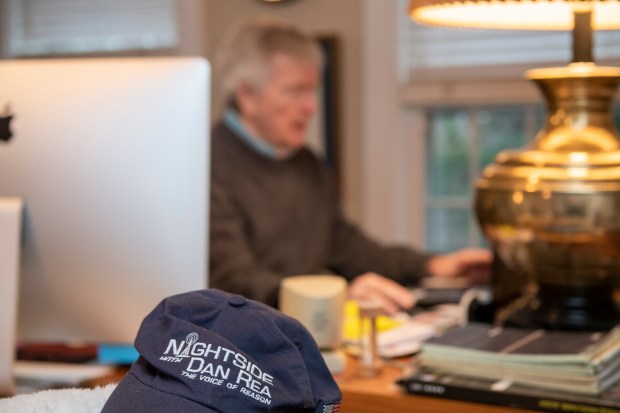Every weeknight, Dan Rea is busy at work upstairs in his Chestnut Hill home.
Wearing a headset with a mic, Rea keeps an eye on his laptop to see who is calling into NightSide, a talk show the veteran Boston newsman hosts on WBZ NewsRadio 1030 AM from 8 p.m. to midnight Monday through Friday.
NightSide entered its 16th year on the airwaves in October, and Rea said he won’t be calling it quits anytime soon. He is having too much fun on what he calls “North America’s Virtual Back Porch,” as he connects with listeners from across the country and in Canada.
“You don’t have to be a U.S. senator or governor to be a caller to my show,” said Rea, a member of the Massachusetts Broadcasters Hall of Fame. “Your voice and your opinion is just as important to me as a governor or senator because you are a part of the fabric of our society. Those voices need to be heard.”
Rea adapted to his remote work environment at the onset of the COVID-19 pandemic in March 2020, more than a year-and-a-half after WBZ NewsRadio moved its headquarters from Soldiers Field Road in Allston to Medford in August 2018.
Working out of his Chestnut Hill home has caused Rea to lose the ability to have eye contact with his guests and read their body language, which made the transition to the remote world challenging.
Rea has overcome those early hurdles, evidenced by the number of listeners and guests that continue to call into NightSide on a nightly basis. Rea broadcasted the year’s final episode of NightSide on Thursday, when he hosted the show’s 10th annual charity combine by interviewing representatives from 22 charities across New England.
Though he has enjoyed interviewing some big-named politicians, such as former U.S. House Speaker Paul Ryan, on his show, Rea said he believes the charity combine is his most important episode of the year.
“I want to connect my audience with some of those charities so they could either contribute to them or volunteer for them,” he said of the purpose behind the charity combine. “Those people are important because of the amount of good they do, more so than a major politician or a famous person.”
Self-identified as an independent, Rea said the topics he discusses throughout his show dictates whether he stays neutral or takes a side. He made his opinion known during a segment earlier this month on the Dedham library director rescinding her initial plan not to put up Christmas trees in the town’s two libraries.
“It would be like me saying, ‘Tonight, I’m going to do a special show and we’re going to do the sounds of silence for an hour,’ ” Rea said. “(Listeners) would be like, ‘You’re a radio talk show host, you have to do a show.’ It just doesn’t make any sense.”
In other instances, Rea said he prefers to give more time to listeners and guests so he can gain a deeper understanding on the issues of the day. Rev. Kevin Peterson, founder of Boston-based New Democracy Coalition, appeared on the Dec. 15 episode to discuss the Boston City Council approving a committee to study reparations for Black Bostonians and what that means.
Rea’s approach to his shows is a shift from when he reported stories “right down the middle” during his 31-year-career as an on-air television reporter for WBZ-TV, the CBS affiliate in Boston.
Awards that Rea has received throughout his decorated career — including the Yankee Quill Award, considered the highest individual honor for journalists in New England — cover a wall near his studio on the top floor of his home.
“I watched this city grow over decades,” Rea said about working in the Boston news industry. “When people talk about the bad old days, hey, I lived in the bad old days. I went to Boston Latin School, Boston State College, Boston University Law School. I’m a Boston guy, very proud of the city but I can still be critical.”
Over the years, as technology and social media have evolved the journalistic landscape, Rea has become active on Twitter, Instagram and Facebook. Every day, either Rea or his producer post previews and recaps of that night’s show on Faceboo
Sometimes, depending on the magnitude of a particular issue, Rea said, stories could be covered “wall to wall,” such as the immediate aftermath of the bombing at the Boston Marathon in April 2013 and the search for terrorist Dhzokhar Tsarneav.
On other days, when the news cycle is slow, Rea said he has to get creative and “come up with a spin that would interest people.”
The WBZ NewsRadio signal reaches 38 states, allowing Rea to form relationships with listeners from across the country and in Canada, including Clark in Pennsylvania, Richard in Toronto, Chuck in Georgia, William in Baltimore and Susan in Chicago, all of whom are frequent callers, he said.
“Without callers, I don’t have a talk show,” Rea said. “I am not the show. The callers and guests are the show. They make the show work. If it’s just me for four hours, who’s going to listen to me for four hours? They may for a while but not for long.”





Leave a Reply